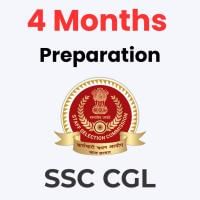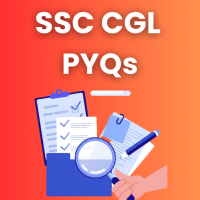SSC CGL Exam > SSC CGL Questions > Select the appropriate verb form: "By the end...
Start Learning for Free
Select the appropriate verb form: "By the end of the year, they _____________ on the project for three months."
- a)will have been working
- b)will be working
- c)will have worked
- d)will be work
Correct answer is option 'A'. Can you explain this answer?
Verified Answer
Select the appropriate verb form: "By the end of the year, they ______...
The correct answer is "By the end of the year, they will have been working on the project for three months." In the Future Perfect Continuous Tense, 'will have been' is used with the '-ing' form of the verb for actions continuing up to a certain future time.
View all questions of this test
Most Upvoted Answer
Select the appropriate verb form: "By the end of the year, they ______...
Understanding the Verb Forms
When choosing the correct verb form, it's essential to understand the context of the sentence and the time frame being referred to. In this case, we are discussing a future event that will have been ongoing for a specific duration by a certain point in time.
Context of the Sentence
- The phrase "By the end of the year" indicates a specific point in the future.
- The action of working on the project is expected to have a duration or continuation.
Correct Option: "will have been working"
- Future Perfect Continuous Tense: This option (a) "will have been working" is in the future perfect continuous tense.
- Duration Emphasis: This tense emphasizes the ongoing nature of the action and the duration up to a future point. It indicates that the action started in the past, continues into the present, and will still be relevant at the specified future time.
Why Other Options Are Incorrect
- Option b: "will be working": This is in the simple future tense, which does not convey the duration aspect.
- Option c: "will have worked": This is in the future perfect tense, indicating that the action will be completed by the future point, not ongoing.
- Option d: "will be work": This is a grammatically incorrect form, as “work” cannot be used as a continuous verb in this context.
Conclusion
By selecting "will have been working," the sentence effectively communicates that the team will have continuously engaged in the project for three months by the end of the year, highlighting both the future time frame and the ongoing duration of their work.
When choosing the correct verb form, it's essential to understand the context of the sentence and the time frame being referred to. In this case, we are discussing a future event that will have been ongoing for a specific duration by a certain point in time.
Context of the Sentence
- The phrase "By the end of the year" indicates a specific point in the future.
- The action of working on the project is expected to have a duration or continuation.
Correct Option: "will have been working"
- Future Perfect Continuous Tense: This option (a) "will have been working" is in the future perfect continuous tense.
- Duration Emphasis: This tense emphasizes the ongoing nature of the action and the duration up to a future point. It indicates that the action started in the past, continues into the present, and will still be relevant at the specified future time.
Why Other Options Are Incorrect
- Option b: "will be working": This is in the simple future tense, which does not convey the duration aspect.
- Option c: "will have worked": This is in the future perfect tense, indicating that the action will be completed by the future point, not ongoing.
- Option d: "will be work": This is a grammatically incorrect form, as “work” cannot be used as a continuous verb in this context.
Conclusion
By selecting "will have been working," the sentence effectively communicates that the team will have continuously engaged in the project for three months by the end of the year, highlighting both the future time frame and the ongoing duration of their work.

|
Explore Courses for SSC CGL exam
|

|
Question Description
Select the appropriate verb form: "By the end of the year, they _____________ on the project for three months."a)will have been workingb)will be workingc)will have workedd)will be workCorrect answer is option 'A'. Can you explain this answer? for SSC CGL 2025 is part of SSC CGL preparation. The Question and answers have been prepared according to the SSC CGL exam syllabus. Information about Select the appropriate verb form: "By the end of the year, they _____________ on the project for three months."a)will have been workingb)will be workingc)will have workedd)will be workCorrect answer is option 'A'. Can you explain this answer? covers all topics & solutions for SSC CGL 2025 Exam. Find important definitions, questions, meanings, examples, exercises and tests below for Select the appropriate verb form: "By the end of the year, they _____________ on the project for three months."a)will have been workingb)will be workingc)will have workedd)will be workCorrect answer is option 'A'. Can you explain this answer?.
Select the appropriate verb form: "By the end of the year, they _____________ on the project for three months."a)will have been workingb)will be workingc)will have workedd)will be workCorrect answer is option 'A'. Can you explain this answer? for SSC CGL 2025 is part of SSC CGL preparation. The Question and answers have been prepared according to the SSC CGL exam syllabus. Information about Select the appropriate verb form: "By the end of the year, they _____________ on the project for three months."a)will have been workingb)will be workingc)will have workedd)will be workCorrect answer is option 'A'. Can you explain this answer? covers all topics & solutions for SSC CGL 2025 Exam. Find important definitions, questions, meanings, examples, exercises and tests below for Select the appropriate verb form: "By the end of the year, they _____________ on the project for three months."a)will have been workingb)will be workingc)will have workedd)will be workCorrect answer is option 'A'. Can you explain this answer?.
Solutions for Select the appropriate verb form: "By the end of the year, they _____________ on the project for three months."a)will have been workingb)will be workingc)will have workedd)will be workCorrect answer is option 'A'. Can you explain this answer? in English & in Hindi are available as part of our courses for SSC CGL.
Download more important topics, notes, lectures and mock test series for SSC CGL Exam by signing up for free.
Here you can find the meaning of Select the appropriate verb form: "By the end of the year, they _____________ on the project for three months."a)will have been workingb)will be workingc)will have workedd)will be workCorrect answer is option 'A'. Can you explain this answer? defined & explained in the simplest way possible. Besides giving the explanation of
Select the appropriate verb form: "By the end of the year, they _____________ on the project for three months."a)will have been workingb)will be workingc)will have workedd)will be workCorrect answer is option 'A'. Can you explain this answer?, a detailed solution for Select the appropriate verb form: "By the end of the year, they _____________ on the project for three months."a)will have been workingb)will be workingc)will have workedd)will be workCorrect answer is option 'A'. Can you explain this answer? has been provided alongside types of Select the appropriate verb form: "By the end of the year, they _____________ on the project for three months."a)will have been workingb)will be workingc)will have workedd)will be workCorrect answer is option 'A'. Can you explain this answer? theory, EduRev gives you an
ample number of questions to practice Select the appropriate verb form: "By the end of the year, they _____________ on the project for three months."a)will have been workingb)will be workingc)will have workedd)will be workCorrect answer is option 'A'. Can you explain this answer? tests, examples and also practice SSC CGL tests.

|
Explore Courses for SSC CGL exam
|

|
Signup for Free!
Signup to see your scores go up within 7 days! Learn & Practice with 1000+ FREE Notes, Videos & Tests.


















